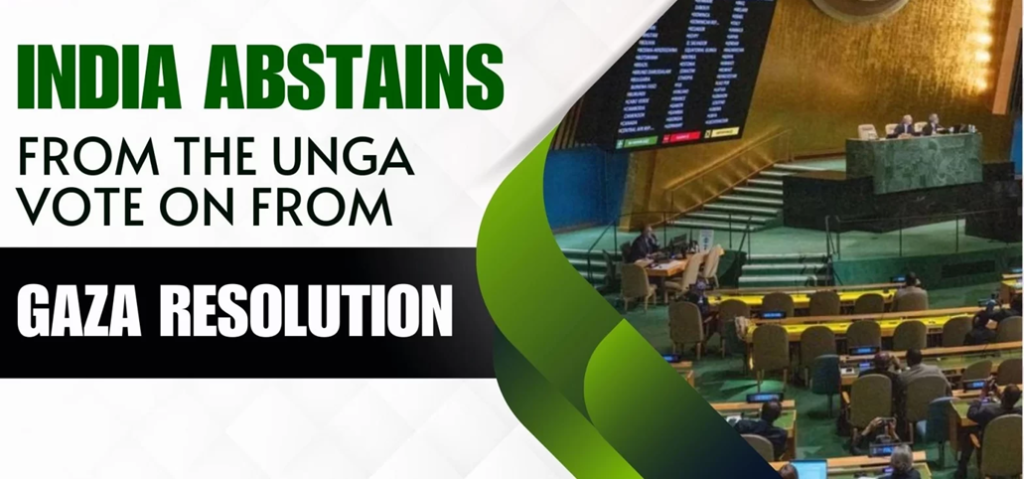India abstained in the UN General Assembly on a resolution that demanded that Israel bring an end, “without delay”, to its unlawful presence in the Occupied Palestinian Territory within 12 months. The 193-member General Assembly adopted the resolution, with 124 nations voting in favour, 14 against and 43 abstentions, including that by India.
India Abstains On Palestinian Motion In UNGA
Why In News
- India abstained in the UN General Assembly on a resolution that demanded that Israel bring an end, “without delay”, to its unlawful presence in the Occupied Palestinian Territory within 12 months. The 193-member General Assembly adopted the resolution, with 124 nations voting in favour, 14 against and 43 abstentions, including that by India.
- Those abstaining included Australia, Canada, Germany, Italy, Nepal, Ukraine and the United Kingdom.
About Resolution
- Most countries have backed a United Nations General Assembly (UNGA) resolution that sets a deadline for Israel to end its illegal occupation of Palestinian territory amid rising international criticism of Israel.
- The resolution, passed, is not legally binding. But it includes stern rebukes of Israel and won the support of many nations in the West that have traditionally backed Israel.
- It was the first time in the history of the UN that Palestine introduced its own draft resolution for voting in the 193-member General Assembly, thanks to the enhanced rights and privileges it received – still as an observer state – after a resolution in May.
What Does The Resolution Say
- The resolution demands that “Israel brings to an end without delay its unlawful presence in the Occupied Palestinian Territory, which constitutes a wrongful act of a continuing character entailing its international responsibility, and do so no later than 12 months”.
- The resolution calls for Israel to comply with international law and withdraw its military forces, immediately cease all new settlement activity, evacuate all settlers from occupied land and dismantle parts of the separation wall it constructed inside the occupied West Bank.
- It says Israel must return land and other “immovable property” as well as all assets seized since the occupation began in 1967 and all cultural property and assets taken from Palestinians and Palestinian institutions.
- The resolution also demands Israel allow all Palestinians displaced during the occupation to return to their places of origin and make reparations for the damage caused by its occupation.
What Does The Underpinning ICJ Ruling Say
- UNGA document was based on an advisory opinion issued by the International Court of Justice (ICJ) in July that declared the occupation illegal and said all states are obliged not to “render aid or assistance in maintaining” it.
- The world’s highest court ruled that Israel is “abusing its status as the occupying power” by building and expanding settlements, using the area’s natural resources, annexing and imposing permanent controls over lands, and undermining Palestinians’ right to self-determination.
- The court issued the opinion after it was sought in 2022 by the General Assembly and as the UN and the vast majority of the international community consider the Palestinian territory as Israeli-occupied.
- Israel captured the West Bank, Gaza Strip and East Jerusalem in the six-day Arab-Israeli war in 1967.
- It was forced to withdraw from Gaza under international pressure in 2005 but maintained a land, sea and air blockade over the enclave.
What Do The Votes Show
- The resolution was approved by 124 UN member states with 43 countries abstaining and 14 rejecting it.
- Against: The list of those opposed includes Israel and its top ally, the United States. Argentina, which in 2010 had recognised Palestinian statehood, has under current President Javier Milei shifted its stance and grown into one of Israel’s staunchest diplomatic supporters. It too opposed the resolution. Paraguay is the only other nation in the Americas that voted against the resolution.
- Hungary and the Czech Republic were the only ones to vote no from Europe, joined by Malawi from Africa and multiple Pacific island countries.
- For: France, Spain, Finland and Portugal were some of the main European countries to vote in favour. Other prominent backers included Japan, China, Russia and Brazil. Overall, almost all of Africa, Europe, Asia and Latin America voted yes.
- Abstentions: India’s decision to abstain meant that it broke with the rest of the BRICS group of leading Global South countries and with all of South Asia, excluding Nepal. Israeli Prime Minister Benjamin Netanyahu counts his Indian counterpart, Narendra Modi, as a close friend. Under Modi — who in 2017 became the first Indian prime minister to visit Israel — ties between the nations have grown substantially as New Delhi has slowly drifted away from its traditional, steadfast support for Palestine.
- Since the start of the war on Gaza, Israel’s Western allies have been mostly abstaining or voting against UN resolutions that seek to protect Palestinians or hold Israel to account. Even watered-down binding resolutions that have been passed by the UN Security Council have not been implemented.















